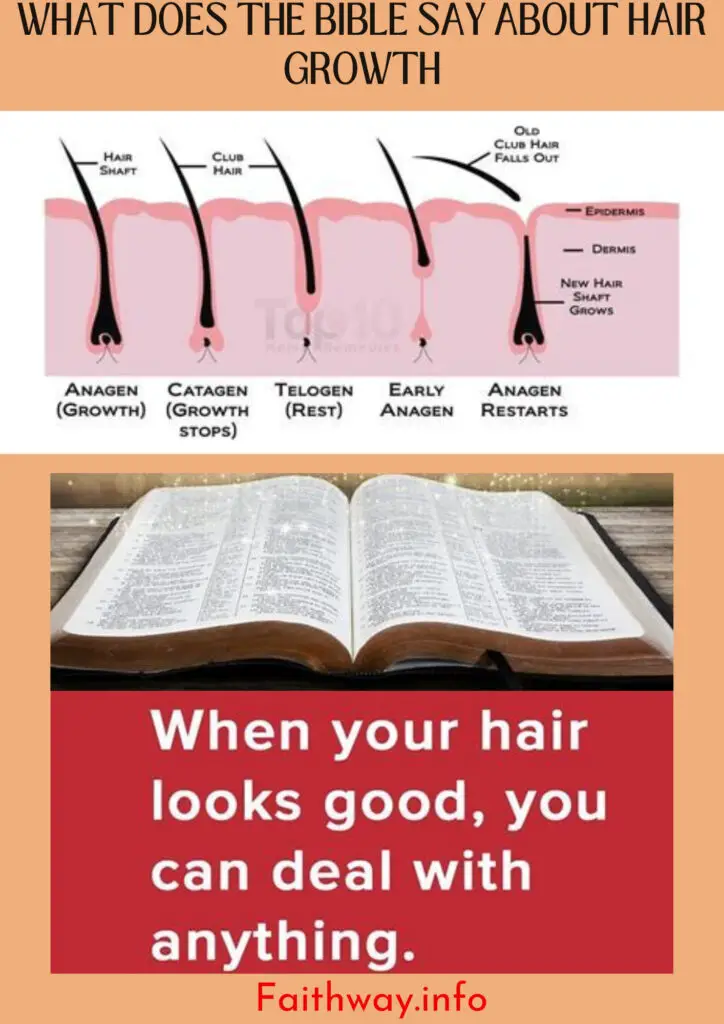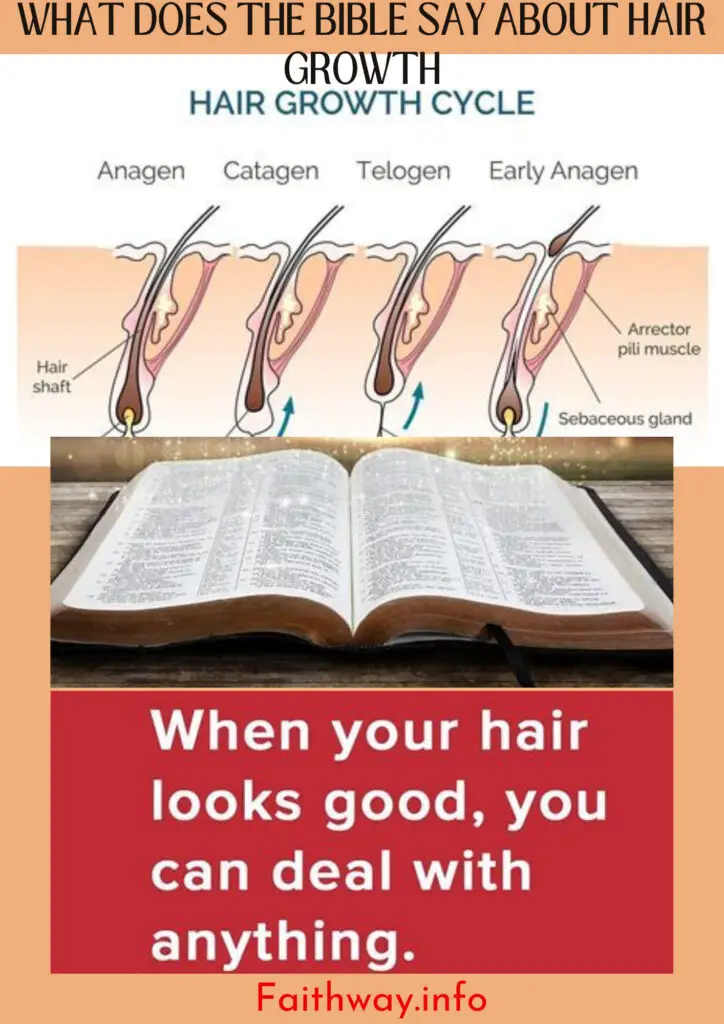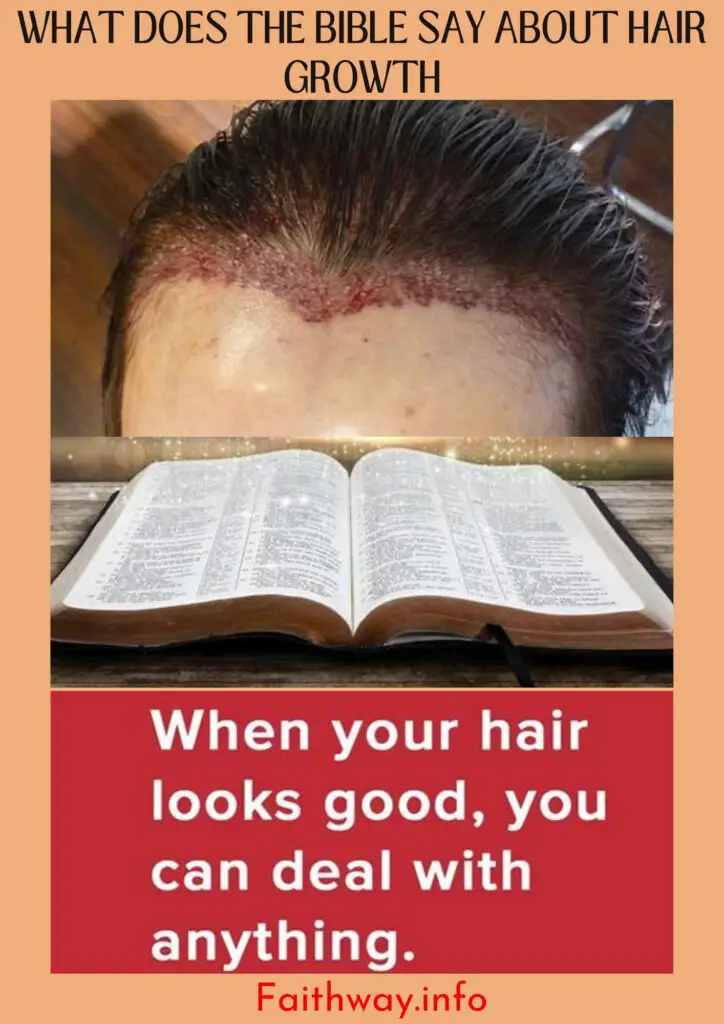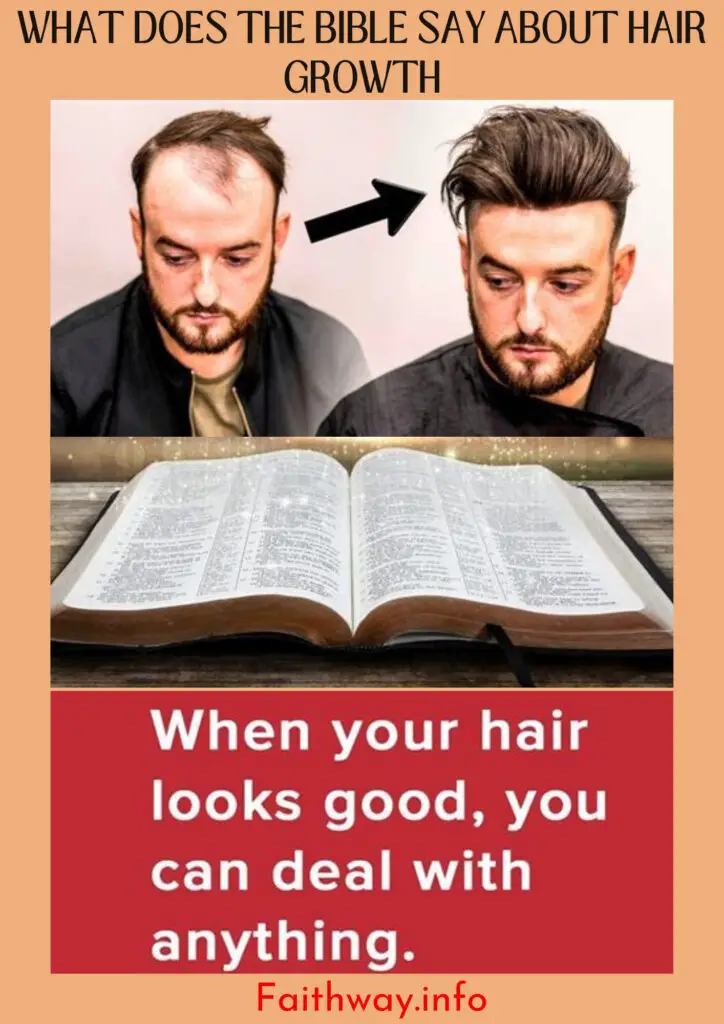Have you ever found yourself pondering the mysteries of hair growth? It is a subject that captivates us all—men and women alike. We are all familiar with the adage, “A woman’s hair is her crowning glory,” and the desire for luscious locks has transcended time and culture.
But have you ever wondered what insights the Bible, that ancient book of divine wisdom, has to offer on this intriguing topic?
Today, we will embark on a remarkable journey through the sacred scriptures, delving into the untapped reservoirs of knowledge that await us.
Let us first travel back to the times of mighty Samson, a man blessed with incredible strength, but whose hair concealed a source of supernatural power.
Remember the story of Samson and the deceitful Delilah? She cunningly discovered the secret of his strength, and in a moment of vulnerability, Samson’s locks were shorn, stripping him of his divine might.
From this captivating tale, we glean a profound lesson: hair can be more than just mere strands of keratin; it can be a symbol of strength, identity, and even spiritual significance.
Power healing Prayers for Hair Growth

As we journey further, we encounter another remarkable figure, Absalom, renowned for his long, flowing hair.
His extravagant tresses became his undoing when he became entangled in the branches of a tree during battle.
Thus, we learn that even the most striking locks can become a hindrance if not managed with care and prudence.
Indeed, it is a reminder that outward appearances can often conceal hidden dangers.
But let us not forget the divine admonitions that resonate through the ages.
The apostle Paul, in his letter to the Corinthians, wrote, “Does not nature itself teach you that if a man wears long hair, it is a disgrace for him?” (1 Corinthians 11:14).
This verse compels us to reflect on the societal norms and cultural contexts that shape our perceptions of hair, reminding us that our choices in grooming can have far-reaching implications.
So, grab hold of your metaphorical comb and join me as we embark on this captivating exploration of biblical insights into the wondrous realm of hair growth.
Prepare to be enthralled, for what lies ahead is a tapestry woven with ancient wisdom, spiritual lessons, and a renewed appreciation for the divine intricacies of hair—truly a journey worthy of your undivided attention.

What Does the Bible say About Hair Growth
The Bible has a lot to say about hair growth. To begin with, there is the biblical admonition by apostle Paul “Doth not even nature itself teach you, that, if a man have long hair, it is a shame unto him? But if a woman have long hair, it is a glory to her: for her hair is given her for a covering.“(1 Corinthians 11:14-15).
In this statement Paul is not ridiculing men for grooming their hair, but rather, He is admonishing men to carry themselves decently and not to allow their hair to grow long like women.
Moreover, this verse implies that one must take care of and honor their hair as it reflects upon one’s physical appearance.
We also know that Acts 27: 34 said “Wherefore I pray you to take some meat: for this is for your health: for there shall not an hair fall from the head of any of you. “
And 1 Samuel 14:45 said “And the people said unto Saul, Shall Jonathan die, who hath wrought this great salvation in Israel? God forbid: as the LORD liveth, there shall not one hair of his head fall to the ground; for he hath wrought with God this day. So the people rescued Jonathan, that he died not.”
These verses clearly indicate that hair is symbolic of life. It follows then, that treating our hair with respect and care can is an important part of our personal grooming routines.
The Bible also contains several references to the importance of hair growth in terms of its spiritual significance.
For instance, God commanded that Nazirites were to allow their hair to “grow for the duration of their vow” (Numbers 6:5). This suggests that hair growth can be a symbolic act of dedication to the Lord. In the same vein, Samson was granted supernatural strength because of his hair, showing that the length of one’s hair is inextricably linked to one’s power and strength.
I mentioned earlier that Paul said “Doth not even nature itself teach you, that, if a man have long hair, it is a shame unto him? But if a woman have long hair, it is a glory to her: for her hair is given her for a covering.“(1 Corinthians 11:14-15).
As such, Samson and other Nazirites had a special covenant with God and therefore couldn’t have cut their hair for the duration of the convent.
The most enduring lesson the Bible offers is that physical health and beauty have their place and are beneficial for our daily functions on earth. For example,
“Beloved, I wish above all things that thou mayest prosper and be in health, even as thy soul prospereth.” (3 John 2:2)
And…
“For bodily exercise profits a little, but godliness is profitable for all things, having promise of the life that now is and of that which is to come.” (1 Timothy 4:8)
Hair growth is part of our physical health, and it serve as a reminder to devote time to take care of our bodies. But above all, looking into our spiritual health.

The Significance of Hair for Jewish People in Biblical Times
There is a word commonly used in theological circles called “exegesis.” Exegesis is the practice of critically explaining or interpreting a text, particularly scripture.
In simpler terms, it involves uncovering the original and intended meaning of a passage in the Bible.
Understanding the truth holds great significance, and that’s why exegetical theology is extremely important.
For example, in biblical times, hair held significant cultural and religious symbolism for the people of Israel.
Understanding hair in its original context will help us to understand the significance of hair if there is and then apply it to our lives.
With that in mind, here are a few references from the King James Version (KJV) Bible that shed light on the significance of hair in that biblical context, especially to the people of Israel:
Strength:
In the story of Samson, his long hair played a crucial role in his strength.
According to the Nazirite lifestyle, which Samson followed, his hair was a symbol of his consecration to God.
Judges 16:17 (KJV) states: “That he told her all his heart, and said unto her, There hath not come a razor upon mine head; for I have been a Nazarite unto God from my mother’s womb: if I be shaven, then my strength will go from me, and I shall become weak, and be like any other man.”
Covering given by God:
In the New Testament, the apostle Paul mentions hair length as a covering given by God both to male and female . 1 Corinthians 11:14-15 (KJV) states: “Doth not even nature itself teach you, that, if a man have long hair, it is a shame unto him? But if a woman have long hair, it is a glory to her: for her hair is given her for a covering.”
Mourning and Grief:
In times of mourning and grief, people often expressed their sorrow by disheveling their hair. Job 1:20 (KJV) describes Job’s response to tragedy: “Then Job arose, and rent his mantle, and shaved his head, and fell down upon the ground, and worshipped.“
Beauty and Attractiveness:
The Song of Solomon uses poetic imagery to describe the beauty and allure of hair. Song of Solomon 4:1 (KJV) declares: “Behold, thou art fair, my love; behold, thou art fair; thou hast doves’ eyes within thy locks: thy hair is as a flock of goats, that appear from mount Gilead.”
Humiliation and Shame:
In certain instances, shaving the head was associated with humiliation or punishment. Isaiah 7:20 (KJV) mentions the consequences of Assyria’s invasion: “In the same day shall the Lord shave with a razor that is hired, namely, by them beyond the river, by the king of Assyria, the head, and the hair of the feet: and it shall also consume the beard.”
These passages illustrate the various symbolic meanings associated with hair in biblical times, including strength, consecration, cultural norms, mourning, beauty, and humiliation.
To sum to everything, I would say that hair, based on its biblical context represents glory and having healthy hair is sign of sound health.

Nutrition for Hair Growth
Proper nutrition plays a significant role in promoting healthy hair growth.
Take care of your hair
Every day, millions of people worldwide struggle to achieve healthy hair growth.
However, it is important to understand that just like any other part of the body, hair growth requires proper nutrition and hydration.
Adequate intake of nutrients, vitamins, and minerals are essential elements to maintaining healthy hair. This includes foods rich in Vitamins A, B, C, and E, as well as proteins, zinc, iron, and other minerals.
Interestingly, some vitamins and minerals related to hair health are often overlooked.
Vitamin B-3, for example, aids in the production of fatty acids, which not only keep the scalp healthy, but can also help stimulate hair growth and reduce hair loss.
In addition, iron is essential for red blood cell production, and it brings oxygen through the bloodstream to the scalp. A lack of iron can lead to weakened, thinning hair.
Hydration is another key factor in keeping hair healthy. Hydrated hair tends to be stronger, shinier, and have less breakage.
Therefore, it is important to drink enough water and stay hydrated in order to keep hair in top condition.
It is also worth noting that massage increases circulation to the scalp, which can also promote hair growth.
To sum up this section, here are some key nutrients, dietary recommendations and tips that can support hair health:
- Protein: Hair is primarily made up of protein, so including an adequate amount in your diet is crucial. Good sources of protein include lean meats, poultry, fish, eggs, dairy products, legumes, nuts, and seeds.
- Omega-3 fatty acids: These healthy fats help nourish the hair follicles and promote scalp health. Include fatty fish (such as salmon, mackerel, and sardines), walnuts, chia seeds, flaxseeds, and hemp seeds in your diet.
- Vitamins and minerals: Several vitamins and minerals contribute to healthy hair growth. These include:
- Biotin: Found in eggs, nuts, seeds, and sweet potatoes, biotin supports hair growth and strengthens hair strands.
- Vitamin C: Helps in the production of collagen, a vital component of hair structure. Citrus fruits, berries, kiwi, and peppers are excellent sources of vitamin C.
- Vitamin E: Provides antioxidant benefits and promotes circulation to the scalp. Include foods like almonds, sunflower seeds, spinach, and avocados in your diet.
- Iron: Iron deficiency can lead to hair loss. Consume iron-rich foods such as lean meats, spinach, lentils, and fortified cereals.
- Zinc: Plays a role in hair tissue growth and repair. Good sources of zinc include oysters, beef, pumpkin seeds, and legumes.
- Water: Staying hydrated is essential for maintaining healthy hair. Drink an adequate amount of water daily to support overall hair health.
- Avoid excessive dieting or restrictive eating: Severe caloric restriction or nutrient deficiencies can lead to hair loss or thinning. Ensure you are getting enough calories and a well-rounded diet.
- Limit processed foods and added sugars: A diet high in processed foods and added sugars can negatively impact hair health. Opt for whole, nutrient-dense foods instead.
- Consider supplements: In some cases, supplements like biotin or multivitamins can be beneficial, but it’s best to consult with a healthcare professional before starting any new supplements.
Remember, while nutrition is important for hair health, other factors like genetics, hormonal imbalances, and underlying health conditions can also affect hair growth.
If you’re experiencing significant hair loss or have concerns about your hair, it’s best to consult a healthcare professional or a dermatologist. We are children of God, and if your hair loss issue is incurable then your faith in God will bring about healing for hair.

Hair Loss Prevention
Many people struggle with hair loss, which can be caused by a variety of factors such as aging, stress, genetics, and even lifestyle.
In order to prevent hair loss, there are a few simple tips that can be followed.
First and foremost, your scalp should be kept clean and free of excess dirt and oil, as this can clog the follicles and prevent healthy hair growth.
In addition, it is important to use the right products for your hair type – for example, dry hair should be moisturized with conditioners that provide nutrients for the scalp and hair.
Moreover, it is important to reduce stress which can lead to hair loss. Stress increases the hormone cortisol, which triggers the production of DHT – a hormone linked to male pattern baldness in both men and women.
You can overcome stress by prayer, reading and meditating on God’s Word, and by just trusting in God on a whole.
On a physical note, following a healthy, balanced diet is also essential for reducing stress and supplying the body with the nutrients it needs to promote healthy hair growth.

Practical Tips for Hair Growth
Healthy hair is a reflection of overall physical health, and proper haircare is an important component of a healthy lifestyle.
A few simple steps can help to promote healthier hair. To begin with, the scalp should be massaged regularly in order to increase circulation and stimulate hair growth.
In addition, proper brushing techniques should be used, as these can help prevent breakage and maintain hair health.
Lastly, regular hair trims are essential for keeping the ends of hair healthy and preventing split ends.

The Benefits of Hair Growth
Growing your hair as a woman offers many benefits, both physical and mental. Growing hair is a great way to express yourself and have fun with your look. It can be a unique way to stand out in a crowd, and a great excuse to experiment with different styles and colors.
Growing out your hair can also be a great confidence booster as you develop and own your personal look.
On the physical side, hair growth offers a myriad of positive benefits. Long hair is said to be the symbol of health, and it can be a sign of youth.
Growing out your hair might even protect the scalp from harmful UV rays from the sun.

Final Thoughts
In conclusion, exploring what the Bible says about hair growth reveals an interesting perspective on the significance and symbolism of hair in various biblical passages.
While the Bible does not explicitly address hair growth as a standalone topic, it offers insights into the cultural, religious, and metaphorical aspects associated with hair.
From the narratives in the Old Testament, we can see that long hair was often associated with strength, vitality, and consecration to God.
Samson’s extraordinary strength was tied to his uncut hair, symbolizing his dedication to God’s service.
Similarly, the Nazirite vow involved abstaining from cutting one’s hair as a sign of devotion and separation unto the Lord.

However, the New Testament introduces a different perspective, emphasizing spiritual growth and humility over outward appearances.
The apostle Paul, in his letter to the Corinthians, encourages men not to let their hair become a source of pride but to adopt a modest and respectful attitude.
While the Bible does not prescribe specific instructions for hair growth, it highlights the importance of inner transformation, character development, and godly virtues.
It reminds believers that their focus should be on developing a relationship with God, cultivating spiritual fruit, and reflecting His love and righteousness in their lives.
It is crucial to interpret biblical passages on hair growth within their historical and cultural contexts.
Hairstyles and grooming practices have varied across time and cultures, and the Bible’s teachings on this subject should be understood within the broader framework of its message of faith, salvation, and ethical living.
Ultimately, the Bible’s teachings on hair growth call believers to prioritize inner qualities and spiritual growth over external appearances.
Whether one has short hair or long hair, the emphasis should be on cultivating a heart that is aligned with God’s will, showing love, kindness, and humility in all aspects of life.
While personal grooming choices may vary, the underlying principle remains constant: to honor God in everything we do, including how we present ourselves outwardly.
As believers, we are called to seek wisdom and guidance from the Scriptures and allow its principles to shape our lives, including our attitudes towards hair growth.

Faithway.info, your online sanctuary for deepening your spiritual journey and mastering the teachings of the Bible. At Faithway.info, we are passionate about making the wisdom of the Bible accessible to everyone, fostering a community dedicated to growth, understanding, and support.
